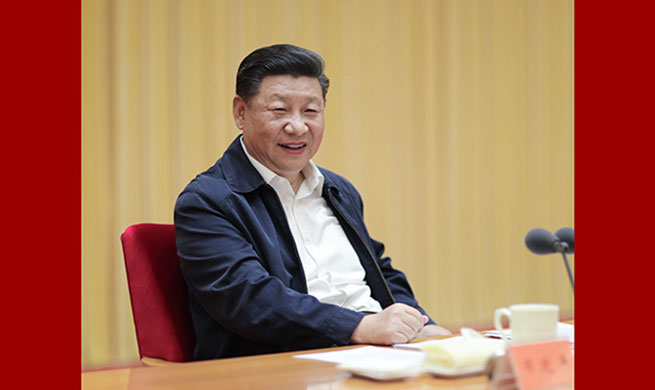BEIJING, Aug. 22 (Xinhua) -- Fourteen international ambassadors for the promotion of giant panda culture were named in Beijing Tuesday night.
The "ambassadors," including foreign ambassadors to China, officials, giant panda experts, entrepreneurs and celebrities, will commit to promoting the cultural symbol of the giant panda around the world.
The event was held as part of the First Giant Panda International Culture Week, to be held in Beijing from Aug. 23 to 26, with the aim of celebrating China's efforts in preserving the vulnerable species and promoting the global influence of giant panda culture.
For decades, the Chinese government has sent giant pandas, regarded by Chinese as a national treasure, to other countries. They are adored worldwide as an envoy for friendship and symbol of peace.
"I visited our beloved giant panda Lin Bing and her two cubs earlier this month in Sichuan and took pictures with them. It was the happiest moment of my life," said Korn Dabbaransi, former vice prime minister of Thailand and president of Thailand-China Friendship Association, who was among the 14 ambassadors.
Lin Bing, the first giant panda born in Thailand, is the daughter of pandas Lin Hui and Chuang Chuang. The couple has lived in Chiang Mai Zoo in northern Thailand since 2003 as part of a panda research program. Lin Bing was sent to southwest China's Sichuan Province to find a mate in 2013 at the age of four.
Since her birth in 2009, Lin Bing has become one of the most popular animals in Thailand, creating an ongoing "panda mania" in the country.
"Lin Bing has attracted the attention of millions of Thai people," said Dabbaransi. "There was even a television channel showing her live feed around the clock."
He added that Lin Bing's name was chosen after a nationwide name selection contest in 2009 that attracted some 22 million postcard-votes, accounting for around 32.8 percent of the country's total population.
"When she was sent to China in 2013, many Thai people were very sad and reluctant to say goodbye," Dabbaransi recalled. "Her fans even chartered two planes to escort her back."
Five years after Lin Bing traveled to China, people in Thailand are still missing the giant panda. "When I told my people that I was going to China two weeks ago, many of them asked me to say hello to Lin Bing," said Dabbaransi.
Early this month, he paid a visit to Lin Bing, who is living in Sichuan's Wolong National Nature Reserve and gave birth to twins last year.
The name "Lin Bing" is a combination of her mother's family name and "Ping River," the name of Chiang Mai's major river, symbolizing the deep friendship between Thailand and China, Dabbaransi said.
"Pandas are always a bridge connecting Thailand and China," he said. "With this bond, the exchanges between our two countries have become deeper and more frequent."
He added that economic exchanges between Thailand and China have been booming in the past few years, with bilateral trade volume topping 74.1 million U.S. dollars last year. An increasing number of Chinese tourists have traveled to Thailand. Meanwhile, more and more Thai people have visited China, not only to see giant pandas but also to study and do business.
"Giant pandas bring happiness and connect people," said Djauhari Oratmangun, Indonesian ambassador to China and also an ambassador for the promotion of giant panda culture. "They are a symbol of the friendship between Indonesia and China."
There are currently two pandas living in Indonesia, Hu Chun and Cai Tao, a couple on a 10-year-loan from China to Indonesia's Taman Safari Zoo since last year.
"More and more Indonesians are learning about giant pandas and becoming interested in China," said Oratmangun. "More Chinese tourists will also visit Indonesia to see the pandas."
He said that people-to-people exchanges will promote cooperation between the two countries in other sectors, such as trade and investment.
The cultural symbol of the giant panda is in line with the China-proposed Belt and Road Initiative because the symbol creates a friendly environment where people and countries are connected, he said.

















